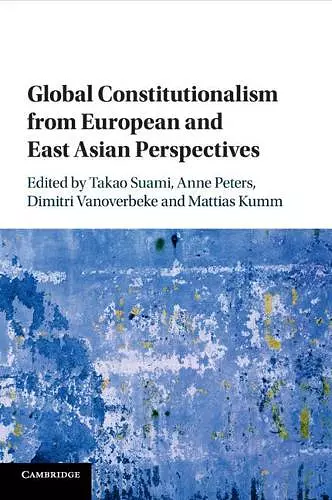Global Constitutionalism from European and East Asian Perspectives
Anne Peters editor Dimitri Vanoverbeke editor Takao Suami editor Mattias Kumm editor
Format:Paperback
Publisher:Cambridge University Press
Published:26th Mar '20
Currently unavailable, and unfortunately no date known when it will be back
This paperback is available in another edition too:
- Hardback£135.00(9781108417112)

Examines and compares East Asian and European perspectives of Global Constitutionalism.
Examines aspects of international and national law including human rights, rule of law, economic integration and social values and engages scholars from East Asia who critique Western ideas, enrich them through non-western practices and help produce transcultural universal categories of international constitutional law.Global Constitutionalism argues that parts of international law can be understood as being grounded in the rule of law and human rights, and insists that international law can and should be interpreted and progressively developed in the direction of greater respect for and realization of those principles. Global Constitutionalism has been discussed primarily by European scholars. Yet without the engagement of scholars from other parts of the world, the universalist claims underlying Global Constitutionalism ring hollow. This is particularly true with regard to East Asia, where nearly half the world's population and a growing share of global economic and military capacities are located. Are East Asian perspectives on Global Constitutionalism similar to European perspectives? Against the background of current power shifts in international law, this book constitutes the first cross-cultural work on various facets of Global Constitutionalism and elaborates a more nuanced concept that fits our times.
'Global constitutionalism is part description, part ascription, and part critical stance. It approaches global governance with understandings of institutions, values, and the construction of meaning, arguments, and norms originally developed in the context of domestic constitutional law. This outstanding collection of essays diversifies that important approach beyond the United States and Europe, where it began, with the promise of reshaping 'global constitutionalism' along the way …' Daniel Halberstam, Eric Stein Collegiate Professor of Law and Associate Dean for Faculty and Research, University of Michigan Law School.
“This important volume breaks new ground by bringing East Asian perspectives to inquiries into over global constitutionalism that, until now, have primarily featured voices from the West. The thoughtful essays in Global Constitutionalism from European and East Asian Perspectives constitute a theoretically sophisticated and intellectually vibrant dialogue that will serve as a touchstone for claims that global constitutionalism suffers from a Eurocentric bias. Moreover, these contributions provide fresh perspectives and insights to ongoing conceptual and normative debates over global constitutionalism.' Jeffrey Dunoff, Laura H. Carnell Professor of Law at Temple University Beasley School of Law, Philadelphia
'Democracy, human rights, and the rule of law are the three pillars of the European constitutional heritage. With the long tradition of humanistic Confucianism, East Asia has shared the principles of Western democracy. From the perspective of a Constitutional Judge in South Korea, the claim that constitutionalism is only a Western idea seems peculiarly Eurocentric when made by a European and distinctly authoritarian when made by government officials in Asia. In a time of increasing nationalism and extremism, this timely volume tackles head on some of the hard questions and concerns connected to Global Constitutionalism. A closer cooperation as this among scholars of Europe and East Asia is vital for the genuine globalization of constitutionalism.' Kang Il-won, Justice, Constitutional Court of Korea
“This book is a timely contribution to the important study of Global Constitutionalism. Its comparisons between two equally aged but very different traditions - European and East Asian - is as insightful it is challenging, since East Asia alone is such an amorphous entity, with China, Japan and Korea standing out as qualitatively different polities. By bringing together scholars from diverse countries, the book provides a rare platform for meaningful dialogues between radically different institutional and cultural traditions.' Zhang Qianfan, Peking University, Beijing
ISBN: 9781108810371
Dimensions: 230mm x 153mm x 32mm
Weight: 850g
623 pages